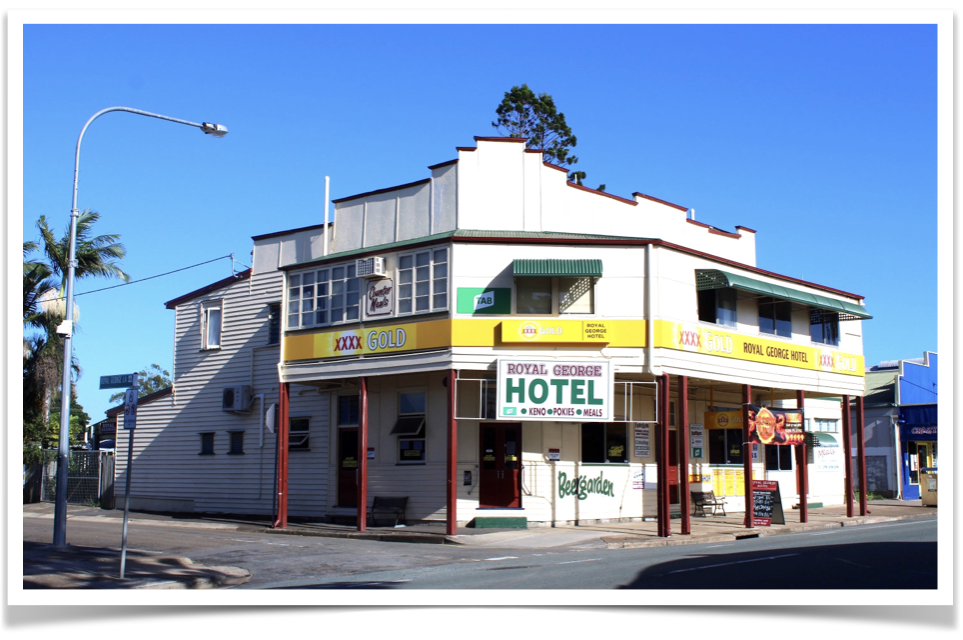
Rosewood History
The Royal George Hotel 1890-1954
“It’s a nice two storey building, with a cellar to keep the beer cool.” – October 1890
Rosewood once had four public houses or “pubs” operating at the same time. The original hotel situated at 24 John Street, was named the Royal Hotel and it was the fourth to be built. After it was destroyed by fire in 1933, the owner at the time, Norah Power, rebuilt it and changed its name to the Royal George Hotel.
The hotel had many ever-changing proprietors and its history is tinged with two very tragic events. In 1926 Mary Francis Downey, the publican’s wife, lost her life in a fire when she was burned from the waist up. Several days previously she had mentioned that she was going to singe the ends of her hair, and it was believed that a flame had come in contact with her brushed woollen sweater. As she rushed from her upstairs bedroom to the verandah, the unfortunate woman bumped her head against a post and fell. She succumbed to shock a few minutes later and died. Just months later her husband Patrick died after a fall. He was only 36 years old.
The other fatality was a Scottish man named Alexander “Sandy” Easton. He died as a result of burns he received at the Royal Hotel when it burned down in 1933. He was a returned service man and was employed as a miner at the Westvale Colliery.
You’ll notice that over the years many of the licensees were women. Ironic really, given that women weren’t allowed to drink in hotels or be supplied with liquor in any room adjoining a bar.
In the late nineteenth and early twentieth century women played a key role in the control and management of the Australian hotel industry. The work didn’t require male-specific skills. On the contrary, the skills required in housekeeping, cooking and serving beverages were more like domestic work than most other occupations and, as such, favoured women. It afforded a rare opportunity for women to work outside the exploitative wages system and to accumulate property and wealth.
The period 1889-1926
John Edward Johnson J.P. – 1889
We begin in November 1889, when John Edward Johnson applied to the Licensing Authority for a provisional certificate for a premises he was going to build in Rosewood. It was to be a hotel fronting John Street. It would be two storeys high and contain fourteen rooms. Edward, as he was known, was the brother of Olivia Harriet Johnson (wife of John William Vance) and his wife, Annie Mary, was the sister of John William Vance. Edward was a senior police constable at Ipswich and Marburg and also a police magistrate in the Rosewood Court.
At first his application for the provisional certificate was refused but he lodged an appeal against the decision.
On the 2nd April 1890, he was granted an extension of two months to finish building the hotel. The recent rains had delayed the building’s progress. He applied for a Victualler’s License for the Sale of Fermented and Spiritous Liquor in the House, and after another adjournment so he could finish the hotel, it was finally granted on the 5th August.
A new building has been erected in Rosewood which is quite a credit to the enterprising proprietor; we refer to Mr. E. Johnson’s new Rosewood Hotel. The building is in the form of a square, the length of which is about 40ft. The contract price for the building was £600, but, with extras, that sum was considerably extended. Mr. H. E. Wyman was the architect and Mr. Sydney Ash the builder, and the building reflects great credit on the abilities of both of these gentlemen. There are eight rooms upstairs and a similar number below, all of which are neatly fitted up with the newest appliances for the convenience of travellers. Upstairs there is a comfortable little sitting-room, from which can be obtained a splendid view of the surrounding country. The various parlours and sitting-rooms downstairs are all neatly furnished, and the bedrooms and bathrooms are quite in keeping with the times. Mr. Johnson has commenced business in his new house, and promises attention and civility to his numerous customers. (1)
In January the next year three men stole money from the till while Annie Mary was tending the bar. The men had been turned away by Edward earlier that morning and returned after they knew he’d left the premises. Annie went to the back room for a few minutes and when she returned the till was open and 9s 9d was gone, and so were the three men. Thomas M’Mahon, Michael Gauy, and Thomas Lambert were aprehended and sentenced to two months’ hard labour. Lambert was also charged with 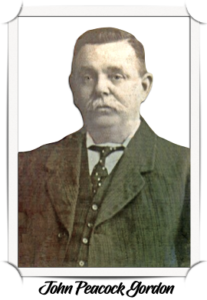 assault on Edward Johnson and received a further one month of hard labour. Read about it here.
assault on Edward Johnson and received a further one month of hard labour. Read about it here.
John Peacock Gordon 1891
On the 6th May 1891, Edward Johnson transferred the license to John Peacock Gordon of Booval, Ipswich. John was a Scottish immigrant from Edinburgh and a keen football supporter. He became the patron of the West End Senior Football Club in Ipswich. Later he ran the Racecourse Hotel and the City View Hotel.
Lauritz Thomas Larsen 1893
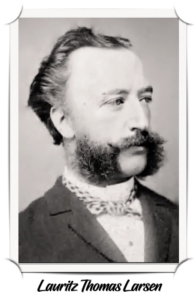
On the 1st November 1893, John Peacock transferred the license to “Lau” Larsen.
Lau was born in 1849 in Copenhagen, Denmark. He was the manager of the Queensland branch of the Transpacific General Insurance Company (Fire & Marine), Eagle Street, Brisbane, which was registered in Sydney, NSW in October 1888. It went into liquidation in 1891. Lau then managed the Railway Temperance Hotel in Roma-street, Brisbane.
In March 1894 he applied for a leave of absence from the Royal Hotel for a month. The application was granted, and Edward Johnson was appointed to be his representative i.e. run the hotel until a new licensee was found.
In September the license of the Royal was transferred to William McCarthy of Rosewood.
Lau and his wife Mary Ann née Bunce and their two children went to New South Wales. Lau and Mary Ann became a grocers. Lau died in a tragic incident in 1906.

William McCarthy 1893
In April 1895, William was summoned by the police for a breach of section 63 of the Licensing Act. (No holder of a license shall keep his premises open for the sale of liquor, or shall sell any liquor, or permit the same to be drunk or consumed, in or on his premises, unless between the hours of six in the morning and eleven at night, on the six business days of the week, and unless between the hours of seven and nine in the morning, and of one and three in the afternoon, and eight and ten at night, on Good Friday and Christmas Day, and, on the two last-mentioned days, only for the sale of liquor not to be drunk or consumed on the premises. And every such holder offending against any part of this enactment shall for every such offence be liable to a penalty not exceeding £20.)
William pleaded guilty and was fined 6s. and cautioned to be more careful in future.
On the same day, John O’Hanlon was charged with obtaining board and lodging and drink to the amount of 9s. from William McCarthy by means of false verbal representations. He asked the court for leniency because he was broke and felt badly about what he had done. He was sentenced to three days’ confinement in the cells.
Mary Catherine Fass 1894
A year later, a joint application by William McCarthy and Mary Catherine Fass (née Brennan) for the transfer of the license from the former to the latter was granted (7th April). Catherine was the wife of Frederick Perry Fass, another Licensed Victualler.
In July, Catherine Fass was granted three months’ leave of absence, and Edward Johnson was appointed to act as agent during her absence. When a licensee was granted “a leave of absence” it usually indicated that the license was about to change hands.
John Edward Johnson 1897
On the 7th April 1897, the license went back to Edward Johnson. He kept the hotel until 13th November when Annie McGuinness (née Linnell) was granted the license.
Annie McGuinness 1897
Annie and her husband Peter had been managing the Avoca Hotel, Leichhardt Street, Spring Hill. Annie left Peter when she took on the Royal Hotel and ultimately ended her days at the Royal Hotel at Charters Towers, where she spent 30 years. This is an example of how a woman could support herself by becoming the licensee of a hotel, thereby gaining her independence and not being reliant on financial support from anyone. It was one of a few avenues available to women in those days.
William Bell 1898
On the 5th October 1898, at the Rosewood Police Court, before Messrs. Mark Bensley and William E. Collett (licensing justices), William Bell from Brisbane applied to have the license of the Royal Hotel transferred to him from Annie McGuinness. William had a wife, no children, and this was the first time he had applied for a publican’s license.
Almost immediately he had trouble.
Yesterday morning at the Ipswich Police Court, before the Police Magistrate and Mr. Thomas Towell, Horace Robinson was charged with having, on the 7th instant, obtained from Mr. William Bell, licensee of the Royal Hotel, Rosewood, the sum of £6 12s. by means of a valueless cheque having the signature “Thomas H. Robinson.” Senior Sergeant Johnson prosecuted. Acting Sergeant J. O Donnell gave evidence of having arrested the defendant at the Commercial Hotel, Ipswich on the previous evening, and on being questioned he (the defendant) said that Mr. Bell had plenty of time to let him know about the cheque having been dishonoured before he (defendant) left Rosewood. “At all events,” added the defendant, “Bell still has my horse and it is valued at £20, so I think that he ought to be satisfied.” (2)
John Gill 1899
The licence then transferred to John Gill from Toowoomba in January 1899 and on the 14th John Gill passed it to Ann Mary Hanlon of Fern Street, Woolloongabba.
Ann Mary Hanlin/Hanlon 1899
James Hanlin bought the hotel from Edward Johnson and Ann had the license. James was born in Launceston, Tasmania. He and Ann married at St. Mary’s Catholic Church in Ipswich before they travelled out West where James worked as a shepherd on the Mitchell Downs Station. Subsequently, he took up Havelock Cattle Station in the Maranoa district. Later he bought Quibet Cattle Station in the Balonne district and then Lauriston Station near Roma. They then went to Gympie for a year before coming to Rosewood and buying the Royal Hotel. They had a family of nine children.
Ann and her husband ran the hotel until James died in July 1902. She carried on without James until August 1903, when the title for the hotel was transferred to her. (Description of Land:-Subdivision I of Resubdivision 25 of Subdivision 2 of Resubdivision I of Subdivision 2 of Free Selection 7L, County of Churchill, Parish of Walloon.)
On Friday evening a very pleasant social gathering took place at Mrs. A. M. Hanlon’s Royal Hotel. The object of the meeting was to present Mr. F. J. Champ, relieving station master, with a small token of the esteem and goodwill won by him during his residence here. Mr. Champ came to relieve the local station master, Mr. James K. Burns, some six or seven weeks ago, and he also came in for a phenomenal spell of hard work, as the tonnage of incoming goods, principally fodder, has become enormous. Mr. Champ has, in spite of his arduous duties, been invariably courteous to all with whom he came in contact, and has made many friends during his short period of residence here. An excellent repast was laid out in first class style. (3)
Maria Costello 1903
On the 7th October 1903, the license transferred to Maria Costello, of Ipswich (widow of Sinon Costello).
By advertisement elsewhere it will be seen that the Rosewood branch of the Hibernian Society is to make its first quarterly communion on Sunday, the 11th instant, and afterwards to hold a communion breakfast in Costello’s hotel. The Rev A. Horan, we are informed, has been asked and has consented to preside. (4)
Hansine Jocumsen 1904
The license transferred to Hansine Jocumsen (née Sorensen), wife of Carl Christian Julius Jocumsen (6th April). Hansine and Carl were from Denmark. Carl previously ran the Club Hotel in Bazaar Street, Maryborough.
Hansine soon found herself before the Police Magistrate at the Rosewood Court in July, where she pleaded guilty to a charge of keeping her hotel open for the sale of liquor on a Sunday. She was fined 20s, with 4s 6d costs of Court. John Green and George Jones admitted they had been drinking there that day and were each fined 1s. with 4s 6d costs.
In April the next year there was a fire. Carl was woken up by the noise of falling bottles. When he went downstairs he found the hotel was full of thick smoke spilling from the bar. He raised the alarm and a bucket brigade was on the scene and the fire was bought under control. The corner of the bar where he kept a stock of cigars, tobacco etc., and also the business books, was destroyed. The ceiling was charred, and in some places, burnt through. The principal loss was the stock of liquors, tobacco, etc., and a good deal of damage was also done by the water. The origin of the fire was unknown, but it was attributed to rats. The stock was insured with the Manchester Insurance Company.
In 1906 Carl and Hansine moved to Cooroy and selected land on which to build a hotel, but things didn’t work out and they ended up taking on the Bayview Hotel in Scarborough.
Edward Michael Howe 1906
The licence of the Royal Hotel went to Edward Howe, Timber-getter, of Rosewood on the 4th April 1906. Edward’s wife was Margaret Amelia née Ahearn.
Michael Driscoll 1907
In January 1907 Michael Driscoll bought the hotel. Michael immediately got to work and made additions to the hotel. New verandahs and balconies and other sundry additions were added and it was painted. The work was done by Mr. James Grieve. Mr. Charles Wilson from Roderick Street, Ipswich was the Architect.
In May, Michael applied to the Licensing Bench for permission to use a gramophone in the hotel. Police Magistrate, Mr. William Edward Collett, said that in his opinion no permission was required to use gramophones on licensed premises.
Elizabeth Lilian Driscoll 1907
In August Michael’s license transferred to his wife, Elizabeth Lilian Driscoll née Conway.
At the Rosewood Police Court in April 1908, again before William Collett, Elizabeth was charged with having committed a breach of sub-section A of section 67 of the Licensing Act by allowing liquor to be supplied to a man, who was at the time, in a state of intoxication. She was fined £2 2s professional costs and 3s 6d costs of Court.
At the Rosewood Police Court, yesterday, before the Police Magistrate, E. Lillian Driscoll, licensee of the Royal Hotel was charged with having permitted an unlawful game to be played on her premises to wit, the game, “Yankee grab” with dice, for money. Mr. W. H. Summerville appeared for the defendant, who was convicted and fined £5, with 5s 4d costs of Court. (6)
William Joseph McNamara 1908
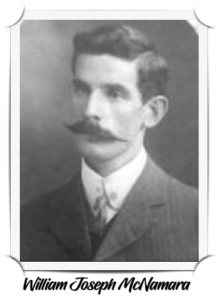 On the 1st July 1908, William Joseph McNamara became the new owner and licensee and he kept it until 1911.
On the 1st July 1908, William Joseph McNamara became the new owner and licensee and he kept it until 1911.
William was the Secretary of the Workers’ Political Organisation in Rosewood. He and his wife Annie Elizabeth “Dolly” née Dwyer became popular residents of the town. Bernie Sloane from the Rising Sun Hotel and William became good friends and mutually obliged each other in business on many occasions.
He took up the matter of there being no drainage facilities provided in John Street with the Council. Water was becoming stagnant in a water-table near his billiard room. It is not known when that problem was resolved.
William was an active member of the A. & H. Association, and was a consistent worker in various “working bees” for the club. His wife also frequently assisted in providing refreshments as well as helping in other ways. When they left Rosewood a banquet was held in William’s honour. He was presented with an inscribed travelling bag along with many heartwarming words and wishes from those present on the occasion. The family left Rosewood and moved to Auckland, New Zealand.
Frederick (Friedrich Wilhelm) Glode 1911
The licence was transferred to Frederick Glode, a farmer from Mutdapilly, on the 5th December 1911. He was about 34 years old and his wife was Louise Caroline née Zahl. They had two children at the time.
Frederick stayed for a year before the lease of the hotel passed to George Clydesdale of King Street, Lutwyche. (License 25th October 1912)
George Clydesdale 1912
In Dun’s Gazette dated September 23rd, 1912, George is recorded as taking out a mortgage of £300 with the Castlemaine Brewery & Quinian, Gray Co. Brisbane Ltd. He mortgaged the stock-in-trade, piano, furniture, three-quarter billiard table, etc. The debt was payable on 10th December that year.
George took an active part in the formation of the Rosewood Turf Club, and obtained a large number of members for it. He also assisted the Rosewood Rifle Club by presenting a valuable cup for competitions.
A new Liquor Act came into force on 1st April 1913. See some of the provisions of the Act.
Tuesday, the 15th April was a red letter day in the Rosewood Licensing district. The first Court was held in the town under the provisions of the new Liquor Act and it was also the first Court held since the creation of a new licensing district. All of the district licensees attended and every hotel in the area had to be improved to meet the new requirements.
The Act required that the hotels had a fire escape and the Licensing Inspector (Sergeant Allen) required them to construct back stairs. Some argued that an iron ladder attached to a wall should suffice as it had been accepted in some Brisbane hotels. The Police Magistrate (Mr. P. W. Pears) said that the staircase was without a doubt the safest option.
Sergeant Allen had previously objected to all of the license renewal applications put before him, and they had been adjourned until this court hearing.
Some of the applicants had complied with the Act and were granted renewals. Bernard Sloane at the Rising Sun Hotel was one of them. The applications of the other Rosewood licensees however, were adjourned until 13th May to permit them to make the required provisions. All of the local houses were required to supply information about their turnover, the amount paid for goodwill etc, to enable the Inspector to assess the premises.
On 26th May, Henry Jacob Wendt (Rosewood Hotel), George Clydesdale (Royal Hotel, Rosewood) and Johanna Thomas (Commercial Hotel, Rosewood) were all granted licenses.
The value of the local hotels were assessed as following. The figures in parenthesis are the license fees. Rosewood Hotel £240. (£35); Rising Sun £240 (£35); Royal Hotel £175 (£30); Commercial Hotel £175 (£30).
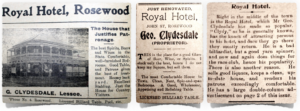
Clippings from the Rosewood Register & Marburg Mail – May 1913
In May 1913, George gave his notice of his intent to transfer the license to Michael Connor of Windsor, Brisbane.
Mr. Geo. Clydesdale, late lessee of the Royal Hotel, was tendered a send-off on Friday night. Mr. James O’shea presided, and made the presentation, which consisted of a smoker’s outfit for Mr. Clydesdale, and a cot of toilet requisites to Mrs. Clydesdale. (7)
George and his wife Susan née Kelly went to run the Brittania Hotel in Laidley.
Michael Connor 1913
Michael Connor and Sara née Cruice were newlyweds when they came to the Royal Hotel. They had only just married on 2nd July at St Stephen’s Cathedral in Brisbane and moved to Rosewood soon after.
Michael renewed his licence in April 1914 and was granted a billiard licence. Both were transferred to John Henry Jacob Heeschen on 6th October 1914.
Michael and Sara Connor left to take on the Stanley Hotel in South Brisbane.
John Henry Jacob Heeschen 1914
John Hesschen, a wood turner by trade, applied to have a publican’s booth at the Rosewood Races that October, which was granted. In January 1915 he applied to have a booth at the races on the 16th, and in the same month, he disposed of his lease of the hotel.
The licence eventually went to Edward Andrew Anderson on the 6th April.
Edward Andrew Anderson 1915
His surname was actually Andresen and is recorded as either in various records. Edward was born in Bundaberg in 1879 to Danish immigrant parents. He stayed at the Royal Hotel for 4 years until his death on 1st July 1919.
The death occurred at St. Helen’s Private hospital, Brisbane, early this morning, of Mr. Edward A. Anderson, of the Royal Hotel, Rosewood. The deceased had been in ill-health far some considerable time, and had spent some months on the Downs endeavouring to recuperate. On his return it was thought he had considerably improved. A few weeks ago he went to Brisbane for further medical treatment He took a sudden change yesterday, and subsequently succumbed; Sincere sympathy is felt for his sister. Mrs. Neville, of Rosewood. (8)
Norah Power 1922
On the 7th March 1922, Edward’s sister, Mrs Agnes Petra Eliza Amelia Neville, disposed of her interests in the business to Mrs. Norah Power, of Brisbane. Norah bought the Royal Hotel for £3500.
Norah (née Doyle) was from Feakle, Co Clare, Ireland. She immigrated aged 18 with her sister Mary in 1891 on the Tara, landing at Brisbane. Norah’s husband, George Alexander Power, was also a publican. He had the Opera House Hotel in Queen Street, Brisbane. Norah and her husband appeared to have had a turbulent marriage by all accounts. He died in 1938.
The wording underneath the caricature of George Power at right says,
This Fasquin Picture shows George Power,
In all his pristine charm and grace,
Before the ruthless razor-blade
Had touched snd changed his handsome face.
He who this portrait of the Past
To-day with George himself compares
Well not that he displays more “cheek,”
But gives himself much fewer “airs.”
Norah possessed a strong character and came to the notice of the authorities on several occasions. She ran the Farmers’ Arms Hotel in South Brisbane and was fined for having adulterated rum in her possession. Then at the Coronation Hotel in Montague Street, South Brisbane she kept her house open for the sale of liquor outside of the regulated hours. On the complaint of the Federated Liquor Trades Union, Norah Power, hotel keeper at Stanley Street, South Brisbane was proceeded against for committing a breach of the award covering bar attendants. She refused to permit Edward Coles, an official of the Union, to inspect the time and wages book kept by her to ascertain what money was owing to a dismissed bar attendant.
Violet Callaghan 1922
Norah didn’t intend to run the hotel herself and in May 1922 Mrs Violet Callaghan (née Cavanagh) took over the Royal Hotel. She was a widower, her husband Dennis having died in 1915. They came from a mixed farm at Gatton. Dennis had worked on the Ipswich to Bigge’s Camp railway line at the time of its construction.
In May it was widely rumoured that Norah Power had died and it was put in the paper. The rumour proved to be untrue and the paper had to retract its statement.
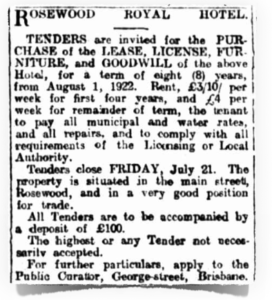 Agnes Neville 1923
Agnes Neville 1923
On the 10th April 1923, the licence was granted to Agnes Neville née Draydon, wife of Thomas Henry Neville, a farmer at Talgai. They had a family of six girls and four boys. Agnes donated the “A. Neville Trophy” to the Rife Club for their competition.
Benjamin Charles Lee 1923
A little over a month later on the 21st May, the licence once passed to Mr. Benjamin Charles Lee. Benjamin Lee came to Queensland in 1890 on the “Taroba”. He married Agnes Maude née Weston when he was 48 years old.
In December that year, at the Rosewood Licensing Court, Frank Klauke pleaded guilty to charge of having been found leaving the licensed premises of the Royal Hotel with liquor in his possession during prohibited hours. He was convicted and fined £1, with 3/6 cost of court in default seven days imprisonment. Seven days were allowed for payment.
On the 9th January 1924, Benjamin Lee transferred the licence to Jane O’Connor and went back to Sydney, the place of his birth.
Jane O’Connor 1924
ROYAL HOTEL, ROSEWOOD – Under the new management of Mrs. J. O’Connor and her sister, Miss K. O’Dea, the above hotel has shown considerable improvement. Mrs. O’Connor is the widow of the late Constable O’Connor, and Miss O’Dea is well-known in the trade, being for a long time at the Prince Consort Hotel, Valley, and other leading hotels. The Royal is what might be styled a country family hotel, and serving Bulimba beer in that district augurs well for a good beer trade. This journal wishes Mrs. O’Connor success in making her debut as a hotelkeeper, and feels sure that that lady and her partner, Miss O’Dea will get on well with the Rosewood people. (9)
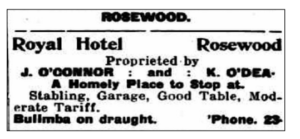 Jane and her sister Kathleen O’Dea (later Reddan) were Irish. Jane was a recent widow with two children. Her husband Richard died in 1923 in Charters Towers.
Jane and her sister Kathleen O’Dea (later Reddan) were Irish. Jane was a recent widow with two children. Her husband Richard died in 1923 in Charters Towers.
In October, Mr. Matthew Augustine Savage, who has been postmaster at Rosewood for a couple of years was transferred to Indooroopilly. Jane and Kathleen were hostesses at a very enjoyable champagne supper at the Royal Hotel, given in his honour.
In March 1926 Jane disposed of the goodwill of the Royal Hotel to a city buyer, Irish born Patrick Joseph Downey.
Patrick Joseph Downey 1926
Patrick’s license was granted on 21st April. Pat had previously run the Pinkenba Hotel.
Just weeks later Patrick’s wife Mary Francis née King died in a tragic circumstance.
BURNT TO DEATH ROSEWOOD RESIDENT. WIFE OF HOTEL LICENSEE. ROSEWOOD, May 28.
A sad fatality occurred at Rosewood this morning, when Mrs. P. J. Downey, wife of the licensee of the Royal Hotel, was burnt to death. It is not known how the accident occurred. About 10.30 a.m., screams were heard from the hotel. Thinking it were his child, Mr. Downey rushed upstairs, to find Mrs. Downey on the balcony enveloped in flames. Help was immediately at hand, Blankets were thrown round the unfortunate woman, who, however, had been terribly burnt before assistance was forthcoming. The ringing of St. Brigid’s Church bell denoted the presence of a fire and a large crowd was soon at the site of the occurrence. Dr. Wallace, assisted by local 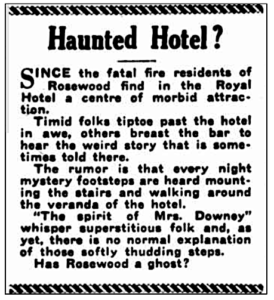 chemists and nurses, did everything possible for the injured woman, and Rev. Father McKenna administered the last rites of the Church before the unfortunate victim succumbed. How the incident occurred is a mystery, as Mrs. Downey was indisposed with dengue, and was last known to be in her bedroom. Attending Sergeant Tighe, and Constable Nolan conducted an investigation, and were unable to discover anything in the bedroom or discover how the fire originated. Mrs Downey was burned from the waist up. There was not a trace of fire in the bedroom. The deepest sympathy is felt for the bereaved husband, and small son (Pat.). Mr. and Mrs. Downey were only recent arrivals in Rosewood, having lately taken over the Royal Hotel, formerly conducted by Mrs. O’Connor. The sad fatality has cast a gloom over the town, as the family, since their arrival, had become very popular, and were highly respected. Mrs. Downey was a native of Gympie, and her relatives reside in Brisbane.
chemists and nurses, did everything possible for the injured woman, and Rev. Father McKenna administered the last rites of the Church before the unfortunate victim succumbed. How the incident occurred is a mystery, as Mrs. Downey was indisposed with dengue, and was last known to be in her bedroom. Attending Sergeant Tighe, and Constable Nolan conducted an investigation, and were unable to discover anything in the bedroom or discover how the fire originated. Mrs Downey was burned from the waist up. There was not a trace of fire in the bedroom. The deepest sympathy is felt for the bereaved husband, and small son (Pat.). Mr. and Mrs. Downey were only recent arrivals in Rosewood, having lately taken over the Royal Hotel, formerly conducted by Mrs. O’Connor. The sad fatality has cast a gloom over the town, as the family, since their arrival, had become very popular, and were highly respected. Mrs. Downey was a native of Gympie, and her relatives reside in Brisbane.
An inquiry was held.
A tragedy which occurred at the Royal Hotel; Rosewood, on May 28, whereby Mary Frances Downey, 29 years, the wife of Patrick Joseph Downey, died from burns, was the subject of an inquiry before Mr. A. Staines, J.P., this morning, in the Metropolitan Inquiry Court. Patrick Joseph Downey, ex-licensed victualler, residing at Hayward Street, Paddington, the husband of deceased, said that on May 28, he was the licensee of the Royal Hotel, Rosewood. About 9 a.m. his wife went upstairs-the hotel was two-storied-to do the household duties. About an hour or so later, witness was in the bar, when he heard loud screams. He rushed into the kitchen, and finding nothing wrong there, went to the front veranda. Another scream came from upstairs, so he rushed up to the top balcony, and in the direction of his bedroom. Just at that moment his wife, who was enveloped in flames from the waist up, emerged. He immediately obtained a blanket from the room, and threw it around her. She collapsed then, and he hurried down stairs, calling for help. Witness received such a shock that he remembered nothing else until he found himself downstairs among some friends. He was informed that his wife was dead. Several days previously she had mentioned that she was going to singe the ends of her hair, and the only con-clusion he could draw as to the cause of the fire was that the flame had come in contact with his wife’s brushed woollen sweater. Witness had lived on very happy terms with his wife. The inquiry was readjourned to Rosewood.
Patrick Downey disposed of his license in July to Mr. Cordell (late of Blackbutt & Waterford) and took his little son and left for Brisbane to live privately at Paddington.
In November the residents of Rosewood were shocked to hear that Patrick Downey had also died after a fall aged only 36.
Read an account an account of his tragic death. MYSTERY OF DEATH OF BRISBANE HOSPITAL PATIENT
Cecil Vincent Cordell 1926
Cecil was a master butcher by trade. He and his wife Ivy Jane née Gilliland had two sons. On the 29th January 1927, the licence passed from from Cecil to his brother Athol Wentworth Cordell and Cecil went back to his trade.
Sadly, in 1945, Cecil was found dead in a spare room of his Kandanga butcher’s shop by Ivy. A .22 rifle was lying beside him. Two years prior Cecil had an sustained an injury to his head while mustering cattle and had been complaining about the effects the injury was still having on him.
The period 1927-1954
Athol Wentworth Cordell 1927
Athol served in the Great War and had been severely wounded. He was a miner when he enlisted in 35 Battalion A.I.F.. He was wounded in action twice in France, first with a severe gun shot wound to his left a hand and the next time he was shot in his left forearm, which left him disability. He married Lynda May née Hayes.
In July Athol joined other Rosewood and Walloon licensees at the Rosewood Licensing Court in a dispute against recent assessment values put on the license fees for their hotels. Previous values are in parenthesis: Rosewood Hotel £50 (£65); Royal Hotel £55 (£75); Commercial Hotel £55 (£80); Rising Sun £45 (£55); Walloon £40 (£50).
In September the Cordells disposed of their interest in the Royal Hotel and had a brief holiday in Brisbane before re-entering business in the Station Hotel at Tiaro.
Gertrude Ann Coates 1927
Mrs. Gertrude Ann Coates and her sister Miss Margaretta Bolle, formerly of Manumba, took over in September. Gertrude was a Milliner in Hackney, London and Margareta had worked as a Cashier’s Assistant before they came to Australia on the Oronsay in 1921. Gertrude married Arthur Coates in 1915 in Hackney.
On the 23rd April 1928 the licence transferred from Gertrude Anna Coates back to Norah Power. Gertrude went to Brisbane and bought several flats and rented them out.
Norah Power 1928
Soon after Norah came back to the hotel, she entertained several friends at dinner in honour of departing Shire Clerk, Mr. Lewis John Lucas. He was moving to Redcliffe where had been appointed Clerk of the Town Council.
On St. Patrick’s night, after a smoke concert, Norah entertained a party of friends including Mr. William Cooper, M.L.A. for Rosewood at supper. An enjoyable hour was spent when several of the visitors contributed musical items.
On another occasion Norah entertained a number of friends at the hotel to welcome Ivan William Kerr of Richmond, who took over from Thomas Llewellyn Southwell as accountant at the Queensland National Bank. After his six years of service Thomas was transferred to Murgon.
The first Campdraft was held at the Showgrounds on 15th April under the auspices of the Rosewood A. & H. Association. Norah donated £5/5/- for the Royal Hotel Draft. In 1929 she secured the publican’s booth at the Rosewood Show for £29.
On the 18th September 1929, Norah Power passed the licence to William Cormack.
William Cormack 1929
On 21st November William had a serious and painful accident when a bottle of hop beer burst and he was struck in the eye by the flying glass. Medical attention was given by Dr. Wallace, who sent him to hospital. He was transferred to the Mater Hospital in Brisbane, and it was feared he might lose his sight in the injured eye. (10)
In September 1931 a Rosewood resident, Joseph West, a retired bookmaker, was charged in the Rosewood Police Court with exhibiting lists in a room at the Royal Hotel, making it appear that bets could be made. He pleaded “not guilty” but on the evidence of Sergeant Tighe and Constable Risch of Rosewood and Constable Dornbusch of Brisbane, he was convicted and fined £10, with 3/6 costs of Court, in default one month’s imprisonment. Seven days were allowed in which to pay the fine.
William was the vice president of the Rosewood Ramblers Football Club and members of the Rifle Club competed for the “Cormack trophy”amongst others. He donated money for prizes at the Camp Draft and his wife, Ethel née McCormack, donated championship sashes for race winners in events run by the Rosewood Amateur Wheelers.
In January 1933, William Cormack appeared in the Magistrate’s Court at Rosewood before Mr. W. Simpson P. M.. He applied for relief in the reduction of the rental of the hotel. It was the first local case heard under the Lessee Relief Act. He gave figures of the takings, expenses, and profits for the three and a half years he had held the license. Mrs Norah Power outlined her liabilities. The P. M. granted relief to the extent of £20 per annum reduction in the rent from December 7, 1932, and the clauses about painting the hotel were suspended until painting was required by the licensing inspector.
Tragedy struck again at the Royal Hotel. A man named Alexander “Sandy” Easton died as a result of burns he received at the Royal Hotel shortly before 3 o’clock on the morning of Monday, 30th October.
One of the most disastrous fires in the history of Rosewood razed the Royal Hotel and two other buildings to the ground in about half an hour. The flames spread like lightning over the two storey wooden hotel, licking round the dry timber in fierce gusts that took in room after room. In no time, the entire hotel was a mass of flames, and the top storey fell with a resounding crash, scattering myriads of sparks in its vicinity.
Hundreds of townspeople were woken up by the ringing of church bells and the sudden glare, which was visible at Ipswich over 12 miles away. The people banded together in bucket brigades to fight the fire. There was no hope of saving the Royal Hotel, so they concentrated on saving the adjoining premises occupied by the newsagent William Baker and hairdresser and tobacconist, Jack Potts. Under the leadership of Sergeant F. Scanlan and Constable W. Turner, they fought valiantly, but in vain, to save these premises. For the next 15 minutes nothing could be heard but the roar of the flame, the crashing of galvanized iron and timber and the bursting of glass.

Earlier photo (1925) of the buildings which were destroyed in the fire in 1933.
Royal Hotel, Baker’s Stationery, Potts’s Hairdresser and at that time Wilson’s Chemist on which the side wall closest to the Hairdresser’s was scorched.
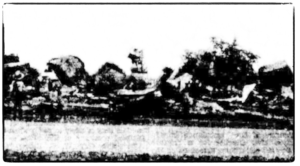
The aftermath. The photo is not great, but I’ve cleaned it up as best I can.
(Notice the child wearing a hat standing on the left looking at the ruins).
This account was published in the Queensland Times on 30th October 1933 on page 1.
FATAL FIRE AT ROSEWOOD. MAN TRAPPED IN BURNING HOTEL. Three Buildings Destroyed Early Morning Blaze
Trapped in the Royal Hotel, Rosewood, which, with two other buildings, were destroyed by fire early this morning, A. (“Sandy”) Easton, a boarder, received injuries from which he died in the Ipswich Hospital several hours later.
The outbreak, which was regarded as the most serious in the history of Rosewood, occurred at 2.45 a.m. Within a short period the hotel and two shops in John Street – William Baker’s stationery business and Pott’s hairdressing saloon – were destroyed. Easton, who was boarding in the hotel premise’s, which were occupied by John Cormack, received severe burns before he was able to leave the building, and was taken to the Ipswich General Hospital immediately.
POST OFFICE THREATENED
The blaze threatened the Post Office, and preparations were made to vacate the premises. A wall of J. A. Wilson’s chemist’s shop caught fire, but a bucket brigade saved the building. The picture show, O’Brien and Yarrow’s store, and a second shop on the opposite side of the street, also caught fire from the flying sparks, but these outbreaks were soon extinguished by the bucket brigade. Live wires which fell across the roadway proved & menace to the sightseers and fire fighters, and electricians were sent from Ipswich to remove this danger. Easton was an employee of Westvale Colliery, Rosewood, and he died in hospital at 6 a.m. He was burned all over the body.
BURNED BEFORE ALARM WAS GIVEN
It is surmised that the fire which fatally burned him and destroyed three buildings here early this morning, broke cut in Mr. Easton’s rooms, and that he was badly burned before the alarm was given.
The ringing of church bells at about 2.45 a.m. awoke many sleepers who hurried to the scene of the fire In the main street, but the two-storied hotel was then well ablaze. The proprietor (Mr. W. Cormack), his wife and family and a couple of boarders escaped in their sleeping attire. Mr. W. Baker’s newsagency and residence, a short distance from the hotel, soon became alight, an although many personal possessions wore saved, the shop, stocks, dwelling and furniture were soon in cinders.
FLAMES SPREAD
Practically no wind was blowing, but the flames soon reached the next building, a smaller shop occupied by Mr. J. Potts, hairdresser, and Mr. T. Quirk, billiard saloon proprietor, and it was also quickly reduced. In the meantime a willing bucket brigade of about thirty men, headed by Sergeant Scanlan and Constable W. Turner, devoted their attention to the next shop and a large dwelling occupied by Mr. J. A. Wilson, chemist, and as several hundred gallons of water were available here, they were able to save the premises. The hotel is owner by Mrs. Norah Power, of Brisbane, and was insured. The contents were also insured. Mrs. A. McLean, of Camp Hill, Brisbane, is the owner of the other two premises, and it is understood that they also were insured.
This is another account which was published the following day.
TRAGIC FIRE. ROSEWOOD MAN DIES. Early Morning Outbreak
The death occurred at 8 a.m. yesterday of Mr. A. (“Sandy”) Easton, at the Ipswich General Hospital. Mr Easton, who was trapped in his room at the blazing Royal Hotel, at Rosewood, was frightfully burnt about the body, almost every strip of his clothing being consumed.
Although the origin of the fire has not established, it seems to have broken out in the top storey, somewhere in the vicinity of Easton’s room, for when Mr. W. Cormack licencee of the establishment, rushed up to the assistance of the boarders quartered in this sectlion, the walls were burning briskly. He entered the boarder’s room through a shroud of smoke and flame, and, suffered minor burns about the arms. With the assistance of another he managed to get Easton out of the building, but the rescuers had arrived just too late to save the unfortunate man. Terrible burns extending a the head to the feet covered his body, and though conscious, he was in a pitiable condition. Friends tried to make him comfortable in a nearby house until the arrival of a doctor and Ipswich Ambulance bearers made a record trip. The patient was admitted to the General Hospital shortly before 4 o’clock, but it was evident that his life had almost run its course. However, he lingred almost two hours, passing about 6 a.m. Easton was a miner employed at the Westvale Colliery.
£80 LOST IN TILL
The Cormacks themselves had a hustle to get away in safety in their scanty night attire. They had no time to save any of their belongongs, Mr. Cormack losing £80 that he had left in the till preparatory to banking early.
The fire swept through the house, and gave Mr. A. Brown, another boarder, no choice but to clamber over the 20ft. balcony as best he could. His way was cut off down the staircase, so hastily cramming a few of his things in two suitcases, he flung them out into street and climbed down a post to safety.
The stationery shop of Mr. Baker, which is separated from the hotel by only a few feet, caught alight before the bigger building had tottered, and Mr. Baker and his family, who sleep on the premises, made a quick get away. Bakers nor the Cormacks had time to save any of their furniture or stock and consequently will be heavy losers. It was thought for a time it might be possible to keep the flame from Mr. J. Potts’s saloon, but it too, was soon engulfed.
GOOD WORK BY BUCKET BRIGADE
With supreme coolness, Sergt. F. Scanlan and Constable W. Turner, set about organising a bucket brigade. There was no lack of volunteers, and in no time a string of buckets passed from hand to hand, and gallons of water were being dashed against the walls of Wilson’s chemist shop, and the grocery establishment of Messrs. O Brien and Yarrow. In both instances a narrow lane separates the buildings, and it was only by dint of extraordinary efforts, particularly in the case of Wilson’s, that the fire fighters were able to effect a save. The walls were smouldering ominously, but the fighters braves the intense heat and had the reward for their peresistence in seeing the premises intact. Had Wilson’s caught, nothing could have saved three other shops in the main section of the township.
Hundreds of people turned out to watch the fire, which was one of the most spectacular and disastrous that has ever blighted Rosewood. At the height of the blaze, flames shot many feet into the air lighting up the street and neighbourhood for hundreds of yards. At Ipswich the glare resembled a sunset. To add to the excitement and thrill of the conflagration, several electric light cables burnt through and fell hissing to the roadway. Word was sent to Ipswich, however, and electricians cut off the power, and danger of electrocution.
THE INSURANCE
The Royal Hotel, which was owned by Mrs. Norah Power and leased by Mr. W. Cormack, was insured for £1375 with the Prudential Insurance Co., and the garage was covered with the same company for £35. Mr. Cormack had his stock, fittings, furniture and personal effects insured with the Mercantile Insurance Co. for £500.
Both the stationery and hairdressing establishments were owned by Mrs. A. M’cLean, of Camp Hill, Brisbane. Baker’s shop was covered to the extent of £700, and the other for £300, both with the Standard Insurance Company. Mr. Baker’s stock was covered from fire by a policy for £500 with the Prudential Insurance Co., but his household furniture, not a stick of which was saved, was not covered. Potts’s billiard table and fittings, were insured for £200 with the State.
When the the first streaks of dawn came, a sorry spectacle was revealed. The charred and smouldering ruins of the three buildings stood out like sombre skeletons, only the embers serving as a reminder of the confict that had raged there a couple of hours previously.
Sandy Easton was a single man aged 35 years, and was a native of Armidale, Midlothian, Scotland. Prior to coming to Australia on the Oronsay in 1921, he had served in the Great War with the Ayrshire battery of the Royal Horse Artillery, which was attached to the Australian Light Horse at Palestine. He was a returned service man and a member of the Rosewood Returned Sailors & Soldiers Imperial League of Australia. Sandy had been living in Rosewood from 1925 until 1932 in Matthew Street and, as the articles above stated, he was employed as a miner at the Westvale Colliery. He died in the Ipswich General Hospital and was buried in the Ipswich Cemetery. The Miners’ Union arranged for his funeral, which was attended in large numbers by employees of Westvale colliery and other district collieries.There were over 40 motor cars in the cortege. Rev. H. J. Taudevin of the Congregational church presided. Mrs. Jock Coleman, Rosewood was a relative.
 Late in November 1933 Norah Power engaged architects Messrs. Cavanagh and Cavanagh. They called for tenders to build a timber and fibro hotel at Rosewood. Mr. Henning Frederick Noel Blase’s tender was accepted and he had started work by the following February. (Blase also built the Brisbane Rowing Club at North Quay in 1930.)
Late in November 1933 Norah Power engaged architects Messrs. Cavanagh and Cavanagh. They called for tenders to build a timber and fibro hotel at Rosewood. Mr. Henning Frederick Noel Blase’s tender was accepted and he had started work by the following February. (Blase also built the Brisbane Rowing Club at North Quay in 1930.)
There was an inquiry into the fire. [Telegraph, Brisbane, 6 February 1934, page 2]
Evidence was heard today by the City Coroner (Mr. J. J. Leahy, Police Magistrate) in an adjourned inquiry into a fire which destroyed the Royal Hotel and two adjacent shops at Rosewood, on October 30, 1933, in which Alexander Easton, a lodger at the hotel, received burns from which he subsequently died. Mrs. Norah Power, of Stephenson Street, Ascot, the owner of the Royal Hotel, Rosewood, in her evidence stated that the building, a two storey wooden structure, contained 13 rooms. She valued it at £2,000. It was purchased over 20 years ago for £3,500, and was then about 30 years old. Since purchasing it witness had increased the insurance by about £150. The total insurance on it at the time of the fire was £1,400.
The licensee, William McCormack, had a 10 years’ lease at a rental of £4 a week. Three years ago he went to the Court and had it reduced to £3 12s. 4d. Witness said that while in Rosewood after the fire she made an examination of the debris, but was unable to discover definitely where the blaze had originated. She had heard that it was first discovered in Easton’s room, and that the licensee had lost £85 in the fire. The average weekly takings, she thought would be about £25. She did not think McCormack could take £85 over the weekend. There was a Gloria lighting system downstairs, but lamps or candles were used upstairs. About two years ago the licensee made a request to have the electric light installed. She did not think there was anything suspicious about the fire. Acting Sergeant T. Long, who examined the witness, gave evidence that the owner of the shops destroyed, Margaret Helen McLean, of Camp Hill, was at present temporarily residing at Rosewood, and he asked for a re-adjournment to that centre. The request was granted.
William Cormack disposed of the remainder of his lease to Mrs. Norah Power from the end of April 1934. In May, the town gave his family a send off at the residence of Mr. and Mrs. G. Pocock. Cards, music, games, and dancing were enjoyed. They were presented with a beautiful dinner service from friends and well wishers of Rosewood by Mr. G Dale. William especially thanked the many people of Rosewood who had loaned the furniture and household requirements for his temporary bar, which he had used since the fire. Mr. Dale’s complementary remarks about the Cormack family were supported by Mr. W. E. Thomas, Sergeant Scanlan, Messrs. G. Draper, J. Roache, S. Farrell, F. Wright, T. Evans, and J. Hogan.
The Cormacks set up business in Manly and quite unexpectedly Ethel died at Wynnum of influenza in July 1935. William passed in 1942.
 Norah Power 1934
Norah Power 1934
The new hotel was renamed the “Royal George Hotel”.
In June 1934 this was in the local paper. “There has been much procrastination in regard to the rat-proofing of the floors of the hotel recently constructed for Mrs. N. Power, Rosewood, and a notice is being forwarded to the architects (Messrs. Cavanagh and Cavanagh) requiring the completion of the work within one month.” (11)
In October Norah was up to her old tricks. She was charged with the sale of liquor after hours, and was fined £10, with costs.
Grace Blair 1935
Mrs. Hugh Blair (Grace) took on the license until early September 1935 when she disposed of her interest in the Royal George to Mr. James Higgins of Brisbane. He was already occupying the hotel. The Blairs went to Brisbane.
Thomas James Higgins 1935
In March 1936 James “Jim” Higgins got permission from the Council to lay an asphalt footpath in front of his hotel.
On Sunday 12th April 1936, shortly before 9 p.m, Jim Higgins and John Hefferan, a radio salesman from Ipswich, were injured in a motor car accident near the Seven Mile. The car failed to take a bend and after leaving the road continued straight ahead into a gully where it struck some piles of an old bridge. Two men, Lee and Ron Williams were fishing at the creek nearby and ran to the scene of the accident. They found both men lying on the ground having been thrown out through the doors of the car. Colin Dutney came along and and went to Rosewood for help. They were attended to by Dr Wallace and taken by ambulance to the Ipswich hospital.
Queensland Times Tuesday 2 June 1936, page 11
Mrs. Groves and children, Noela and Len, who have been at the Royal George Hotel for several months, left by the Canberra on Saturday for Sydney.
A farewell social was held in the hotel late September in 1936. At the invitation of Jim Higgins a number of friends assembled to say goodbye to William Baker who has been in business at Rosewood for a number of years. Cr. George Dale occupied the chair and presented William Baker with a gold-mounted cigarette case, and gold-mounted pencil. William thanked everyone, especially Jim Higgins and said he had been a good neighbour and one of the best sports he had met.
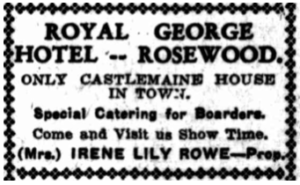 In November 1936 Jim Higgins diposed of his interest in the hotel to Thomas Dwyer of Brisbane.
In November 1936 Jim Higgins diposed of his interest in the hotel to Thomas Dwyer of Brisbane.
Thomas Sydney Dwyer 1936
Thomas took over on Wednesday, 18th November and was granted his license 17th December 1936.
In April 1937 Thomas Dwyer left Rosewood. He was farewelled by a number of friends at the hotel and they gave him a smoker’s outfit as a gift. The family left Rosewood for Brisbane.
Irene Lily Rowe 1937
Irene Rowe from Melbourne, the wife of Richard Rowe, took on the hotel. They and their daughters were in residence at the hotel before the Dwyers left. While Irene was in charge she hosted the wedding reception for Miss Ellen Agnes (Girlie) Roache, only daughter of Mr. and Mrs. J. L. Roache after her marriage to Mr. Ralph J. Skinner, only son of the late Ralph J. Skinner, of Boston, U.S.A., and late Commander in the U.S.A. Navy. They were married at St Brigid’s Church on 2nd October 1937.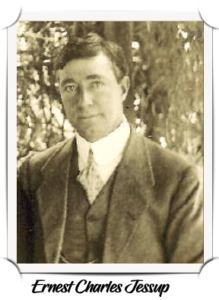
Ernest Charles Jessup 1938
The licence transferred again on 13th May 1938 to Ernest Charles Jessup. Then on the 6th October to George Friedrich. Jessup went on to run the Engineers Arms Hotel at Maryborough.
Georg Emil Friedrich 1938
George Friedrich had the hotel for the next six years.
In February 1942 he catered for the wedding reception of Miss Helen Patricia Johnson of Rosewood, and Mr Arthur Bryce of Bundaberg, after their marriage in St Brigid’s Church. The tables were adorned with vases of roses.
Rosewood. Nov. 23 1944 – The death occurred in the Ipswich Hospital recently, of Mr. George Friedrich, licensee of the Royal George Hotel, Rosewood. The late Mr. Friedrich became seriously ill a week before and was taken to hospital on Monday, November 13. His death occurred several days later. He was 56 years of age, and was a native of Berlin. For the last six years, with his wife and daughter. Mr. Friedrich conducted the Royal George Hotel at Rosewood: previously he lived in Brisbane. He is survived by his widow and daughter, Miss Edith Friedrich, both of the Royal George Hotel, Rosewood: and a sister, Mrs. Stan. Armstrong, Brisbane. The funeral took place on Saturday at the Mt. Thompson Crematorium. Pastor Lohe, of the Lutheran Church, conducted a service at the crematorium.
Mrs Violet Friedrich and her daughter Edith (barmaid) ran the hotel until Warwick Leeson bought it.
Warwick Roy Victor Leeson 1946
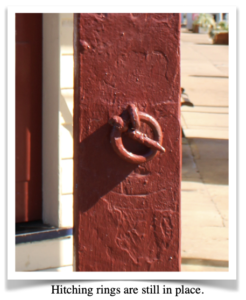 In January Norman Ruhno conducted a successful auction sale of furniture on behalf of Warwick Leeson, who had recently moved from his property “Bremer View,” Lanefield to Rosewood to conduct the Royal George Hotel.
In January Norman Ruhno conducted a successful auction sale of furniture on behalf of Warwick Leeson, who had recently moved from his property “Bremer View,” Lanefield to Rosewood to conduct the Royal George Hotel.
Warwick was the secretary of the A. & H. Association at the time and a member of the Rosewood Citizen’s Band and the Rosewood Fishing Club.
In August 1947, Warwick engaged Mr. A. Kleidon (Mt. Walker West), to sink a bore at the hotel on a site picked by Mr. Fred Profke, of Rosewood. At a depth of 87ft, water was struck, and Mr. Leeson decided to continue to a depth of 92ft and the water rose to 40ft. The water was very good quality and was used for household purposes. Apparently in some instances tank water was becoming scarce and water had to be carted from Amberley, which is why is decided to try and get his own supply.
In July 1948 the Leesons left Rosewood for Gatton where Warwick had acquired Hutchinson’s Agency (auctioneer, commission and produce agent). He sold the hotel and their “nice bungalow” in Rosewood township before they left.
Edward Roderick Chilcott 1948
Edward Chilcott was born in 1895 in Murwillumbah, New South Wales. He had the lease of the Prince of Wales Hotel in Brisbane St, Ipswich for almost seven years prior to February 1948, when he came to take on the Royal George Hotel. He joined the Rosewood Fishing Club.
Edward and Grace Chilcott’s (née Paxton) daughter Dorothy Dawn Chilcott married a twin, Basil Thomas Krebs from Mt Marrow and their daughter Alice Audrey Chilcott married William Bade from Rosewood.
Edward Chilcott was still the licensee until he died on the 2nd December 1954 at the Ipswich Hospital aged 59 years.
Norah Power died 15th November 1953 in Brisbane and is buried in Balmoral Cemetery.
Further information will be added below as it is discovered for the years post 1954.
Ronald Allen and Joan Margaret Kanofski 1958-1963
Herbert Allan & Jennie Schubel – 1968
Sel and Hazel Heit – 1975
© Jane Schy, 2024
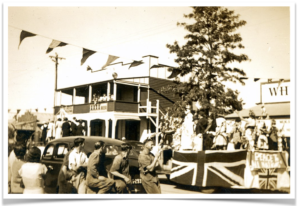
Coronation Parade past the Royal George Hotel, Rosewood. June 1953
Photo: Picture Ipswich
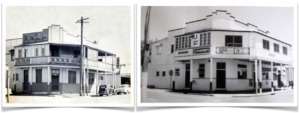

Sources:
Queensland Registry Births Deaths & Marriages
Queensland State Archives
Queensland Immigration Indexes
Dun’s Gazette
Rosewood Register & Marburg Mail (Rosewood, Qld: 1911-1938)
Queensland, Australia, Immigration Indexes, 1848-1972
(1) Queensland Times, Tuesday, 12 August 1890, page 4
(2) Queensland Times, Saturday, 15 October 1898, page 4
(3) Queensland Times, Thursday, 2 October 1902, page 6
(4) Queensland Times Saturday, 3 October 1903, page 9
(5) Queensland Times, Thursday, 2 May 1907, page 11
(6) Queensland Times, Saturday, 13 June 1908, page 4
(7) Brisbane Courier, Monday, 21 July 1913, page 10
(8) Queensland Times, Thursday, 3 July 1919, page 2
(9) Catholic Advocate, Thursday, 3 April 1924, page 35
(10) Queensland Times, 24 November 1930, page 6
(11) Queensland Times, Friday, 15 June 1934, page 6

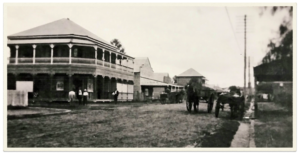
4 Comments
Great reading a lot of history
Thanks Gaylene.
Lau Thomas Larsen was my 2x-great-grandfather.
Wow. I’m impressed with how quickly you amended the article with the new info re: Lau Larsen and J E Johnson. Many thanks. If I ever find anything new I’ll let you know. Cheers. Rod.